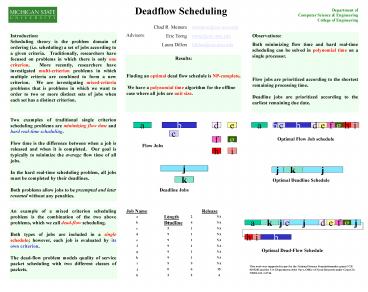Deadflow Scheduling - PowerPoint PPT Presentation
1 / 1
Title:
Deadflow Scheduling
Description:
Traditionally, researchers have focused on problems in which there is only ... Both problems allow jobs to be preempted and later resumed without any penalties. ... – PowerPoint PPT presentation
Number of Views:19
Avg rating:3.0/5.0
Title: Deadflow Scheduling
1
Deadflow Scheduling
Department of Computer Science
EngineeringCollege of Engineering
Introduction Scheduling theory is the problem
domain of ordering (i.e. scheduling) a set of
jobs according to a given criteria.
Traditionally, researchers have focused on
problems in which there is only one criterion.
More recently, researchers have investigated
multi-criterion problems in which multiple
criteria are combined to form a new criterion.
We are investigating mixed-criteria problems that
is problems in which we want to order to two or
more distinct sets of jobs when each set has a
distinct criterion.
Observations Both minimizing flow time and hard
real-time scheduling can be solved in polynomial
time on a single processor. Flow jobs are
prioritized according to the shortest remaining
processing time. Deadline jobs are prioritized
according to the earliest remaining due date.
Results Finding an optimal dead flow schedule
is NP-complete. We have a polynomial time
algorithm for the offline case where all jobs are
unit size.
Two examples of traditional single criterion
scheduling problems are minimizing flow time and
hard real-time scheduling. Flow time is the
difference between when a job is released and
when it is completed. Our goal is typically to
minimize the average flow time of all jobs. In
the hard real-time scheduling problem, all jobs
must be completed by their deadlines. Both
problems allow jobs to be preempted and later
resumed without any penalties.
Optimal Flow Job schedule
j
k
Optimal Deadline Schedule
Deadline Jobs
An example of a mixed criterion scheduling
problem is the combination of the two above
problems, which we call dead-flow
scheduling. Both types of jobs are included in a
single schedule however, each job is evaluated
by its own criterion. The dead-flow problem
models quality of service packet scheduling with
two different classes of packets.
Job Name Release Length Deadline
a b c d e f g h i j k
0 4 5 9 9 9 9 9 9 0 2
2 4 1 1 1 1 1 1 9 6 2
NA NA NA NA NA NA NA NA NA 15 4
a
c
d
e
f
g
j
j
k
j
b
h
i
Optimal Dead-Flow Schedule
This work was supported in part by the National
Science Foundationunder grant CCR 0105283 and the
U.S. Department of the Navy, Office of Naval
Research under Grant No. N00014-01-1-0744.
April 20, 2006































